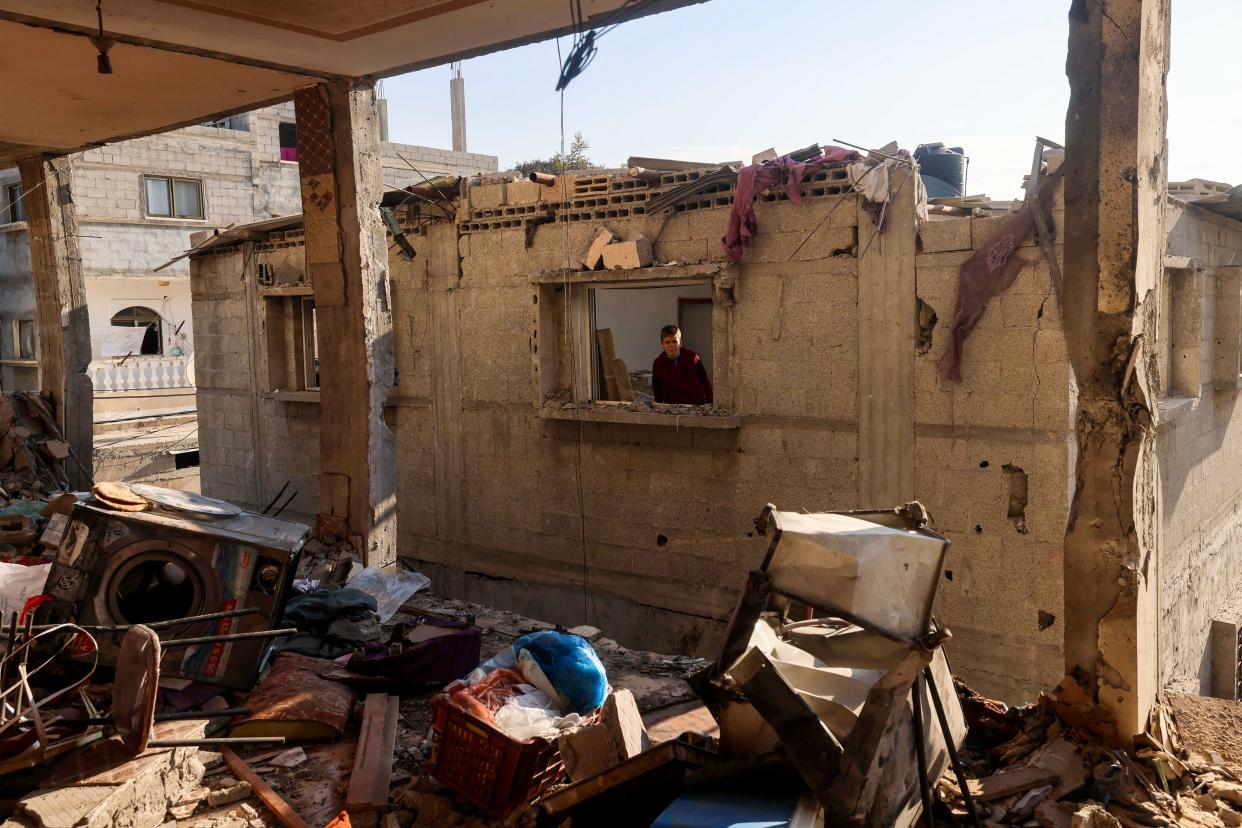The Israel-Hamas war dominates headlines. Is it affecting voters in New Hampshire?

- Oops!Something went wrong.Please try again later.
The bloody conflict between Israel and Hamas has dominated the world's attention and the nation's headlines.
How much does it matter to voters back home?
A USA TODAY/Boston Globe/Suffolk University poll of New Hampshire, the state that holds the first presidential primary of the season in two weeks, finds both divided opinion about what the United States should do in the Middle East and limited impact on how they'll vote.
The conflicting goals that complicate global diplomacy in the region are also reflected in public opinion here.
"I'm not really sure what the solution is there," said Philippe Arel, 70, a retired businessman and Republican from Dover, New Hampshire, who was among those surveyed. "It's certainly a mess that's getting worse."
Asked about U.S. goals in the conflict, there is little consensus on what the top priority should be: 28% say aiding Israel militarily to eliminate Hamas; 25% say pushing for a ceasefire; 23% say using it as an opportunity to create a two-state solution by establishing a Palestinian country, and 7% say removing Israeli Prime Minister Benjamin Netanyahu from power.
In a warning sign for President Joe Biden, a strong supporter of Israel, two-thirds of Democratic voters want to either create a two-state solution (34%) or push for a ceasefire (32%), and another 12% would like to oust Netanyahu. Only 11% say the top priority should be aiding Israel's stated goal of eliminating Hamas.
In a speech Monday at Mother Emanuel AME Church in Charleston, S.C., Biden was heckled by a handful of protesters demanding a ceasefire in Gaza. "I understand their passion," the president said.
The poll of 1,000 likely voters in New Hampshire, taken Jan. 3-7 by landline and cellphone, has a margin of error of plus or minus 3.1 percentage points.
Overall, 49% of those surveyed say they sympathize more with Israel, 16% more with the Palestinians, 15% "both equally."
Among Democrats, though, there is less affinity with Israel: 28% sympathize more with the Palestinians, 26% more with Israel, 21% both equally.
How is Biden doing?
Biden has been negotiating that difficult territory since a brutal Hamas attack on Israel Oct. 7 launched a war that has now killed thousands in Gaza.
In the poll, 45% of New Hampshire voters say Biden's approach has been "about right," while 17% say he has been too supportive of Israel and 12% say he has been too supportive of the Palestinians.
Asked how their assessment of the president might affect their vote, 38% say it makes them less likely to support him while 20% say it makes them more likely to support him.
Thirty-nine percent say it makes no difference.
The potential impact on younger voters raises another warning sign for Biden, according to David Paleologos, director of the Suffolk University Political Research Center. Among those younger than 35, almost half (49%) say Biden's handling of the Israel-Hamas war makes them less likely to vote for him. Just 10% say it makes them more likely.
"This is a critical voting bloc for Biden not only in New Hampshire but in the key swing states," Paleologos said.
"Israel has oppressed Palestinian people for a long time," said Christine Hayes, 50, a nurse and an independent voter from Rochester, N.H. "A terrible atrocity was done [to Israel] but killing innocent people is not the answer." She criticized Biden's support of Israel and Netanyahu.
Would it affect her vote in November?
"Unfortunately, no," she said, "because I have to vote for democracy in America, so I have to vote for Biden."
Asked to choose the most important issue facing the country, just 6% cite foreign policy generally, trailing the future of American democracy (30%), immigration and border security (24%), the economy (17%) and abortion (6%). (While the percentages are the same, abortion was named by 60 respondents, foreign policy by 57).
Closer to home: Immigration as a threat
Those surveyed see other challenges as the biggest threat to U.S. security: 24% cite China and 22% cite the Ukraine-Russia war, compared to 14% who name the Israeli-Hamas conflict.
The threat ranked at the top is illegal immigration, chosen by 30%.
There are partisan differences. An overwhelming 58% of Republicans choose immigration as the biggest threat, while Democrats rank Ukraine as the top threat and independents name China.
Whatever the impact of foreign policy on the election, immigration does loom as a voting issue.
Almost half of those surveyed (47%) call the number of immigrants entering the country "among the most serious issues facing the U.S.," and another 32% call it "a major problem, but not an emergency." Only about one in five (19%) call it a minor problem or none at all.
Immigration was ranked second on the list of the most important issues facing the country, and first among Republicans.
"We need a secure border," said Tony Simpson, 64, a mechanic from Merrimack, N.H., who plans to vote for Trump in November. "I mean, you don't let somebody just walk in your house and move in."
This article originally appeared on USA TODAY: Poll: In the NH primary, do voters care about the Israel-Hamas war?

